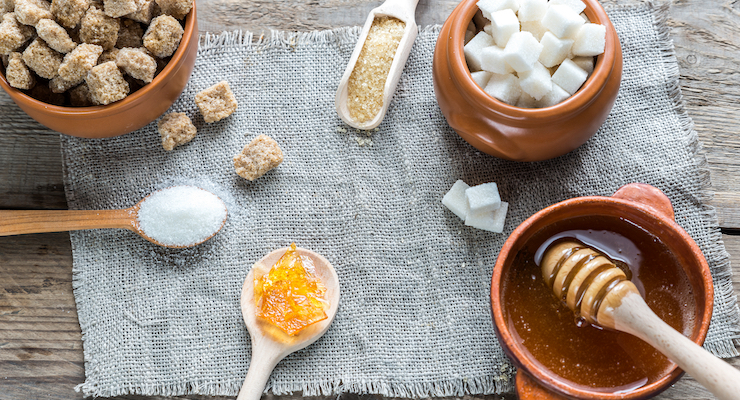12.22.20
A recent clinical trial, conducted by the Endocrine Society and published in the Journal of Clinical Endocrinology and Metabolism, found that sucrose and glucose effected hunger-suppressing hormones to varying extents.
The study on 69 healthy, young adult participants between the ages of 18 and 35 required the participants to consume a drink containing either glucose or sucrose. The researchers found that glucose was much more effective in promoting the production of multiple appetite-regulating hormones than sucrose was, based on subsequent blood testing following the administration of the sugary beverages. The hormones were insulin, GLP-1, and PYY.
While excessive sugar consumption is considered a contributing factor to obesity, these findings show that the impact may be nuanced based on which type of sugar is being consumed more prevalently. Glucose is predominantly found in honey and dried fruits, whereas sucrose (equal parts glucose and fructose) is more often added to processed foods.
While age, sex, bodyweight, and other individual characteristics effected the responses to the different sugars, the difference between glucose and sucrose responses were still statistically significant across the study population.
The authors inferred based on their findings that sucrose is likely to be less efficient at signaling feelings of satiety after a meal than glucose.
“This study is the first to show that individual characteristics, including body weight, sex, and insulin sensitivity, effect hormone responses to two different types of sugar, sucrose and glucose,” Kathleen Page, MD, an author of the study said. “These findings highlight the need to consider how individual characteristics affect the body’s responses to different types of sugar and other nutrients in our food supply.”
The study on 69 healthy, young adult participants between the ages of 18 and 35 required the participants to consume a drink containing either glucose or sucrose. The researchers found that glucose was much more effective in promoting the production of multiple appetite-regulating hormones than sucrose was, based on subsequent blood testing following the administration of the sugary beverages. The hormones were insulin, GLP-1, and PYY.
While excessive sugar consumption is considered a contributing factor to obesity, these findings show that the impact may be nuanced based on which type of sugar is being consumed more prevalently. Glucose is predominantly found in honey and dried fruits, whereas sucrose (equal parts glucose and fructose) is more often added to processed foods.
While age, sex, bodyweight, and other individual characteristics effected the responses to the different sugars, the difference between glucose and sucrose responses were still statistically significant across the study population.
The authors inferred based on their findings that sucrose is likely to be less efficient at signaling feelings of satiety after a meal than glucose.
“This study is the first to show that individual characteristics, including body weight, sex, and insulin sensitivity, effect hormone responses to two different types of sugar, sucrose and glucose,” Kathleen Page, MD, an author of the study said. “These findings highlight the need to consider how individual characteristics affect the body’s responses to different types of sugar and other nutrients in our food supply.”




























